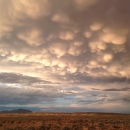States
WyomingWyoming Collaborative Sage-Steppe Mesic Habitat Restoration
| Funding Year | Amount | Location |
|---|---|---|
| FY22 | $250,000 | Johnson, Fremont and Carbon Counties |
| FY23 | $318,000 | Johnson, Fremont and Carbon Counties |
| FY25 | $122,000 | Johnson, Fremont and Carbon Counties |
Project Description
This project will restore more than 10,000 acres of wet meadow/riparian habitat on largely private rangelands to increase species diversity and drought resilience in core sagebrush sagebrush
The western United States’ sagebrush country encompasses over 175 million acres of public and private lands. The sagebrush landscape provides many benefits to our rural economies and communities, and it serves as crucial habitat for a diversity of wildlife, including the iconic greater sage-grouse and over 350 other species.
Learn more about sagebrush habitat in Wyoming using a variety of techniques ranging from off-stream water and fencing to hand-built rock structures to in-stream engineering.
Partners
Private Landowners, Wyoming Wildlife and Natural Resource Trust (WWNRT), Natural Resource Conservation Service (NRCS), Wyoming Game and Fish Department (WYGF), Local Sage Grouse Working Groups, Wyoming Association of Conservation Districts (WACD), Local Conservation Districts, Rock Springs Grazing Association (RSGA), Water for Wildlife Foundation (WWF), Ducks Unlimited (DU) and more




